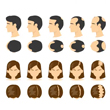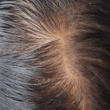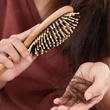Does Iron Deficiency Cause Hair Loss?

Introduction
Hair loss has a considerable impact on a person's life. It can be a physical, psychological, or even a social problem. There are many reasons why a person may be suffering from hair loss. Most commonly, people believe that baldness can be caused by genetics. But did you know that there are other reasons for it as well?
Iron deficiency is one of the most common nutritional deficiencies and is associated with many symptoms, including hair loss. But how is iron deficiency linked to hair loss? What are the symptoms, and how can you treat iron-deficiency anemia?
This article will answer all these questions and everything else you must know about iron deficiency. Read on.
What is Iron Deficiency? 1,2,3

Iron deficiency is defined as reduced iron content in the body. In many cases where the deficiency is severe enough to affect the red blood cells' production, it is termed Iron Deficiency Anemia (IDA). Without enough iron content, the body cannot produce hemoglobin, which is required for red blood cells to carry oxygen. This can make a person experience shortness of breath and feel tired.
Usually, iron deficiency can be cured with supplements and a balanced nutritional diet. However, for proper diagnosis and a suitable treatment option, it is advised to consult a doctor.
Causes and Symptoms of Iron Deficiency 3,4,5

Iron deficiency occurs when your body has reduced iron content and cannot support the production of hemoglobin and red blood cells. This could be due to reduced intake of iron or losing too much of it. Possible causes of iron deficiency include:
- Pregnancy : Pregnant women are at a higher risk of developing iron deficiency due to the increased blood volume of the mother as well as the fetus using up the mother's iron reserves for hemoglobin.
- Blood loss : Losing blood can reduce the iron content of your body. Women who have heavy menstrual bleeding can develop iron deficiency anemia.
- Improper diet : If your diet does not supply the iron required by your body, iron deficiency can develop. For proper iron intake, ensure to include iron-rich foods like eggs, spinach, meat, etc.
Iron deficiency can initially show mild symptoms, which can go unnoticed, but the symptoms can become more pronounced as the deficiency progresses. Some common symptoms of iron deficiency are :
- Extreme and unexplained fatigue
- Cold hands and feet
- Weakness and shortness of breath
- Chest pain and fast heartbeat
- Headache, dizziness, or lightheadedness
- Pale skin
- Brittle nails and hair loss
- Inflammation/soreness or a swollen tongue
- Whooshing in the ears
- Unusual cravings for dirt or ice
- Poor appetite in infants and children
Are You at Risk of Developing Iron Deficiency? 3,4

Depending on diet, medical history, etc., some people are at a higher risk of developing an iron deficiency. Some of them are:
- Pregnant women
- Breastfeeding mothers
- Women with heavy menstrual periods
- People who have a gastrointestinal disease like celiac, Crohn, or ulcerative colitis
- People who may have peptic ulcers
- Those who have undergone bariatric surgery or gastric bypass.
- Vegetarians who do not consume enough dietary iron
- Those who have recently had a surgery
- Frequent blood donors
Does Iron Deficiency Cause Hair Loss? 6,7

While patients with chronic hair loss are often asked to test their iron levels, there is not enough evidence to support the claim that iron deficiency is directly responsible for hair fall. This is a debated issue, but anecdotally, patients with telogen effluvium who are prescribed iron supplements show a reduction in hair fall and an increase in serum ferritin levels.
When the body is low on iron, it usually borrows ferritin from other non-essential sources like your hair follicles. The best way to avoid this is by treating the underlying iron deficiency.
How to Treat Iron Deficiency Hair Loss? 6,7

To treat the iron deficiency, your doctor may prescribe supplements or treat any underlying health issues causing the depleted levels of iron in your body. Here are some treatment options for iron deficiency:
1. Iron supplements: The most common way to cure iron deficiency is to take iron supplements. However, iron supplements must only be taken if prescribed and in the suggested dosage. Often iron is not easily absorbed orally, and so the doctor might prescribe it in combination with Vitamin C or ask the supplements to be taken with lemon water or orange juice, etc. While taking iron supplements, keep these few things in mind:
- Do not take it along with antacids as it may hinder the absorption of iron.
- Avoid drinking milk two hours after taking iron as it may reduce the absorption of the mineral.
- Iron tablets are best consumed on an empty stomach; however, if you do experience an upset stomach, you may take it with your meals.
- Iron causes dark-colored stools and may lead to constipation too.
2. Treat underlying causes: Next treatment option is to cure any underlying issue responsible for the deficiency. The doctor will take your entire medical history and diagnose the issue. Depending on the cause, the doctor may also prescribe you antibiotics for ulcers, oral contraceptives for heavy menstrual flow, or in severe cases a surgery in case of internal bleeding, etc. In serious cases, iron may be given intravenously to help replace hemoglobin or iron urgently.
3. Dietary changes: Chances are that the deficiency of iron is due to an improper diet. In such cases, a doctor will prescribe you to have iron-rich foods like liver, beef, legumes, whole grains, nuts, spinach, dried fruit, prunes, eggs, etc. Consuming Vitamin C-rich foods along with iron-rich foods can help increase iron absorption.
Final Thoughts
While iron deficiency is fairly common, untreated deficiency can cause further health complications along with worsened hair fall. A balanced diet packed with iron-rich leafy greens and meat will prevent iron reserves from depleting and keep your hair healthy and strong. Iron deficiency cannot be corrected in a few days. It usually takes months of eating supplements to replenish the iron to the levels your body needs. So be patient and follow the doctor's advice for correct dosage and when to stop taking supplements.
Myth Busters HairFall

Androgenetic Alopecia - Everything You Need To Know
Have you been experiencing excessive hair fall over a prolonged period of time? It could be an early sign of androgenetic alopecia. It is a hair loss disorder common in both genders and can lead to progressive thinning and even baldness in some patients if not caught and treated early.

How To Make Hair Grow Faster For Men
A head full of healthy hair is a matter of confidence. Hair has its own mechanism of growing and shedding, and it is when this mechanism is thrown off that growth is hindered. Especially in the case of males, hair growth faces a lot of hiccups that can easily be managed.

Female Pattern Baldness - Causes & Treatments
Have you suddenly noticed an increase in the number of hair strands on your pillow in the morning? Or is your ponytail getting thinner by day? Well, you might be suffering from female pattern baldness. While that does sound scary, identifying it early on is key to treating this condition effectively. So keep reading to know what this is, how you can identify it, and most importantly, what treatments you can avail of to get your beautiful lustrous hair back.

What Are The Reasons For Hairfall?
Almost everyone experiences some amount of hair thinning over the years. Shedding around 50 to 100 single strands of hair per day is considered normal. However, losing more than 150 strands a day, experiencing sudden thinning, or developing circular bald patches on your scalp are reasons for concern. Hair loss occurs when new hair doesn’t grow fast enough to replace the amount of hair you lose daily. Hair can fall due to various reasons, with hereditary hair loss and poor nutrition being the most common hair fall reasons.

Expert Approved Tips For Hair Growth
What can be more debilitating than seeing hundreds of hair strands shedding from your scalp every time you brush your hair? Also, excessive molting occurs during seasonal changes that can be very stressful for you. Although it’s okay to lose between 50-100 strands every day, according to the American Academy of Dermatology, the problem occurs when you start shedding more than normal. But that doesn’t mean you have to feel helpless as there are ways to grow your hair back. Even if you are coping with baldness or alopecia, certain hair growth tips from dermatologists can come to your rescue. Read on to discover how these tips can be your savior when abnormal hair fall problems are in sight.
Trending Videos
+ 7 Sources
'LMRC - GGI-CO-A2-DMA-300001252-300001252-WM-L21-704'
© 2021 Dr. Reddy’s Laboratories Ltd. All rights reserved.